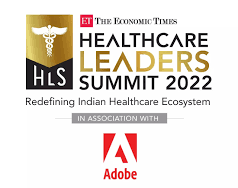[ad_1]

New Delhi: The healthcare landscape of our country is always on the edge. It is constantly manoeuvring disruptions and transforming itself in the face of uncertainties. The role of healthcare leaders has been critical, especially in the last three years where they have combatted the COVID-19 pandemic and etched out a post-pandemic world, conceiving a progressive future.
The healthcare sector is a coalition of hospitals and medical institutions, diagnostic facilities, pharmaceutical organisations, medical device manufacturers and innovative solution providers delivering ever-evolving technologies. Each of these ecosystem partners have driven key investments and upgrades to the healthcare landscape. In the spirit of a robust healthcare delivery ecosystem, The Economic Times organised the second edition of Healthcare Leaders’ Summit 2022 in association with Adobe, silver partners Qlik Q, Lagozon Technologies, Wolters Kluwer, fibe and supporting partner Medtronic on November 17, 2022, at The Westin, Gurgaon.
The event hosted policymakers, healthcare thought leaders, providers, academicians and scientists to discuss and deliberate on medical education, health research and development, affordable treatment, value-based leadership, diagnostics and the hospital infrastructure in India.
The Guest of Honour Dr Jitendra Singh, Union Minister of State for Prime Minister’s Office, Minister of State for the Ministry of Science and Technology and Minister of State for Ministry of Earth Science, Government of India, shared insights on ‘Building a Cohesive Healthcare Ecosystem in India through Proactive Government Initiatives’. He informed that India is fast emerging as the medical tourism hub of the world and that more than 10 lakh medical visas were issued to foreigners between 2019 and 2022. Dr Singh added that in the medical device industry, “We are in the five countries in the world globally, who are ahead of others in manufacturing medical devices. Besides India, the others being the US, China, Japan, and Brazil. But compared to the other four, the cost of our medical devices is just about 1/3rd. In some cases just about 1/4th.”
Highlighting the state government’s perspective on ‘State Governments’ strategy for affordable and inclusive healthcare ecosystem’, TS Singh Deo, Minister of Health and Family Welfare, Government of Chhattisgarh, discussed the strategies to ensure quality healthcare in India and the role and contribution of state governments in the healthcare sector during the ‘Leader Power Talk’. He emphasised, “All governments must have the right to health legislation which binds into providing healthcare through public money, where out-of-pocket expenses are minimised to the least possible. And a large section of the population is prevented from falling into the poverty trap.”
The summit commenced with the inaugural session on ‘Building back better: Reset to Sustainable & Resilient Recovery Post-Pandemic’. The panel discussion was graced by Prof Dr Rajesh S Gokhale, Secretary, Department of Biotechnology, Government of India; Dr Harsh Mahajan, Founder, Mahajan Imaging; Dr Srinath Reddy, Founder (Past) President, PHFI and Honorary Distinguished Professor of Public Health; and was moderated by Vikas Dandekar, Editor, ETPrime (Health & Pharma).
During the discussion, Dr Mahajan said, “All these years in the clinical field, we followed the western pattern, where you talk less to the patient and get more tests done because you believe in those tests. That’s how youngsters today have been schooled. So we become dependent on these tests. No one wants to get treated without those tests that has increased costs. It has also improved outcomes there’s no doubt.”
A partner presentation followed the inaugural session by Adobe on going digital with Adobe Doc Cloud to simplify the healthcare process. Silver partner Wolters Kluwer made a presentation on ‘Adoption of Digital Health across the Continuum of Care; Clinicians, Hospitals, and Pharmaceuticals’.
Panel discussions:
The summit was a host to influential leaders from the healthcare sector who discussed and deliberated on some important affairs in the industry. The focus was on making healthcare affordable and accessible for the masses while remaining true to quality.
The first leadership panel on ‘Medical Education & Health R&D: Now is The Future’ addressed the integration of innovation in medical education and health R&D, the opportunities for innovation in medical training programmes and technologically advanced strategies leading to educational reforms. The panel included GS Naveen Kumar IAS, Secretary, Health and Family Welfare, Government of Andhra Pradesh and moderator Kartik Sharma, Senior Associate Editor, ETGovernment.
Commenting on strengthening the healthcare system, Kumar said “We need to reduce the out-of-pocket expenditure. We need innovations to come in a big way, digital technologies to come in a big way so that the gaps in the public health infrastructure can be bettered.” He informed that the government is looking at building Tirupati as the hub of cancer research. They plan to collaborate with institutions within Tirupati to build it into strong medical education and research hub.
The subsequent panel discussion was on ‘Roadmap of the Healthcare and Diagnostics Sector – Disruption or Value Creation’ to discuss the vital role of technology in diagnostics and how the sector is evolving. The panellists for this session were Vishal Bali, Executive Chairman, Asia Healthcare Holdings; Sameer Anjaria, COO, SRL; Dr Ravi Gaur, Founder & Director, DRG Path Lab and Chairman, Medical Advisory Committee Unipath Specialty Laboratories Ltd. Dr Arjun Dang, CEO, Dr Dang’s Lab was the moderator for the session.
Dr Dang highlighted, “Post-pandemic, patients understand what the value of the correct report is. And at the end of the day, it’s that report that’s going to decide the maturity of the decisions that doctors make, so it’s anything but a commodity.”
Adding to the session, Bali said, “One of the biggest drivers of change in the healthcare sector is the power of the consumer and that seems to be rising more and more. The rise of integrated healthcare worldwide and here, at the centre of that is how we actually provide healthcare services to our consumers.”
This was followed by a session on ‘Digital Health: Role of Tech & AI Leaders’. The highlight was the challenges and opportunities in the transformation of healthcare and protecting patient privacy and data protection in the era of digital health. The panel hosted eminent CIOs to discuss their role in building the digital healthcare ecosystem. Sunil Kumar Bhushan, Deputy Director General, NIC; Dr Sushil K Meher, CIO, AIIMS Delhi; Vishal Gupta, Group CIO, Lifecare Hospitals & Bliss Medical Centres; Praveen Bist, CIO, Amrita Hospital, along with the moderator Rajiv Sikka, CIO, Medanta – The Medicity.
Succeding the CIO session, the pharma IT leaders discussed how they are balancing business and IT interface, in the ‘Pharma CIOs Changing Paradigms: Striking balance between business agility and IT quest’. The panel consisted of Vinayak Neeralli, Head – Digital (India), Dr Reddy’s Laboratories; Jitendra Mishra, VP-CIO, Akums Group; Sachin Bachal, HEAD – IT, Gufic Biosciences, along with moderator Dr Gaurav Arya, Executive Director, Health Nerds International.
Dr Arya said, “Earlier data was seen as my property vs yours, that’s changing now. At the end of the day, it is the patient’s data. The data that belongs to the community and will hopefully improve the patient outcomes as well in future.” Adding to this, Bachal suggested that, “More important is how to leverage this data. We have to use a combination of technologies to extract data and put it to the best use. We need to invest in technology that helps in faster analysis of data.”
The discussion was followed by a presentation by supporting partner Medtronic on ‘Addressing healthcare barriers through Innovation and Partnerships – A healthcare technology perspective’.
The event’s last panel was the Healthcare CEO’s Session on ‘New Found Focus of CEOs in change management and transformational leadership’. Prominent CEOs of the healthcare domain including Dr Santosh Shetty, Executive Director & CEO, Kokilaben Dhirubhai Ambani Hospital; Commander Navneet Bali, Regional Director (North), Narayana Healthcare; Dr Raajiv Singhal, Founder Member, Managing Director & CEO, Marengo Asia Healthcare; Akshat Seth, CEO, CK Birla Healthcare Group; Amol Maheshwari, Chief Distribution Officer, Fibe, along with moderator Dr Rajib Dasgupta, Head Centre for Social Medicine and Community Health, JNU, and Managing Editor, Indian Journal of Public Health (IJPH), JNU, discussed on how India’s healthcare is focussing on affordable treatment, technology integration and adaptation for a connected ecosystem.
Commenting on the role of leadership during the pandemic, Commander Bali said, “First thing that happened in the pandemic was that the entire thing about power was thrown out. We saw the best of humanity and the worst of humanity. It was more about collaboration than about leadership.”
Informing about the challenges for hospital leaders, Dr Shetty said, “One of the biggest challenges hospitals faced was uncertainty, unavailability of staff, the fear factor. This was one condition where some of the staff and doctors were initially apprehensive in the first phase. Every hospital really stepped up to ensure employees were in a good head sphere.”
“Lot of people who actually showed the traits of true leaders will never make it to the stage, they are the nurses and the doctors who actually worked in ICUs during the most difficult times. They exemplified that for being a leader, you don’t need a title, you need to actually perform on the ground,” concluded Dr Singhal.
Healthcare Leaders’ Summit 2022 was followed by The Economic Times Healthcare Awards 2022 where contributors in the field of healthcare were recognised for their efforts and innovations based on a set of parameters.
[ad_2]
Source link
